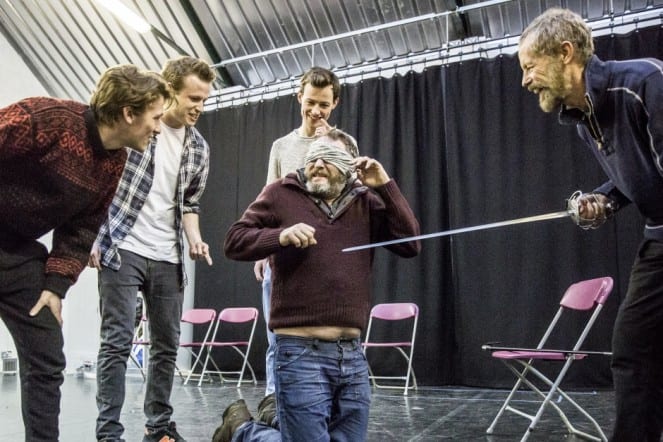Like Measure for Measure, All’s Well That Ends Well is a ‘problem play’ rather than a true comedy, a play where the comedy is often defined more by a sense of averted tragedy than by any true sense of joy. That is certainly the case in this production – walking out of the theatre, much of the audience seemed disgruntled by the ending, and that largely has to do with the magnificently arrogant and rash Bertram (Craig Fuller), whose callous and selfish behaviour leads to much heartbreak. Fuller is often very funny, almost tripping over himself with lust as he attempts to seduce Diana (the feisty Isabella Marshall). He is also very good during Bertram’s rare moments of vulnerability, bringing a real depth to the often loathsome character, but none of it is quite enough to stop the audience from desperately wanting him to get his comeuppance.
Bertram and Helena (Eleanor Yates) generally work well together – All’s Well That Ends Well is filled with anxiety around whether language connects to reality, with Helena mourning that her well wishes cannot take bodily form. This frustration is well played by Yates, and the best moments between the two of them often come in the form of taught silence, something which is perhaps not utilised as much as it should be. In fact, the delivery throughout the play can often feel rushed, especially by Parolles (the otherwise excellent Paul Currier, who swaggers around the stage to great hilarity). Yates is at her best during Helena’s moments of speaking out, exuding a quiet confidence that provides a very strong centre to the play. However, there can be points where she is a touch too “nice”, and I never felt as if the true depth of Helena’s heartbreak was communicated.
The production was marketed as a comedy, and it is always careful never to veer too far into the darkness that lies underneath the surface. The King of France (Christopher Bianchi) is more crotchety grandfather than magnificent monarch – although there a moments of darkness, these are quickly dissipated through the laugh lines, and there is little sense of the genuinely terrifying power of a king like Leontes. However, the production also played up the relationship between Bertram and his dance master Lavatch (Marc Geoffrey), casting Lavatch as unrequitedly in love with his superior. This could easily have edged into stereotype, especially if played for laughs, but Geoffrey’s performance meant that it had a genuine pathos, instilling Lavatch with a tragic dignity that does not diminish even at his lowest moments.
In fact, it is Lavatch that provides the production with the greatest sense of just how fragile this “happy” ending is. All’s Well That Ends Well is famous for its problematic ending, and Bertram and Helena’s inevitable reunion is both broken up my comedy and shadowed by the frowns of the older lords in the background, who have only just declared him a worthless scoundrel. In fact, the reunion that feels most natural and heartfelt is between Helena and the Countess (Julia Hills, who is full of sharp-edged wit), whose interactions throughout the play are full of a much-needed sincerity. The play has a much stronger second half, largely due to the tense final scene and the hilarious capture of Parolles, but at times it plays it a little safe, and there are moments where you long for the violence of it all to truly be exposed.

